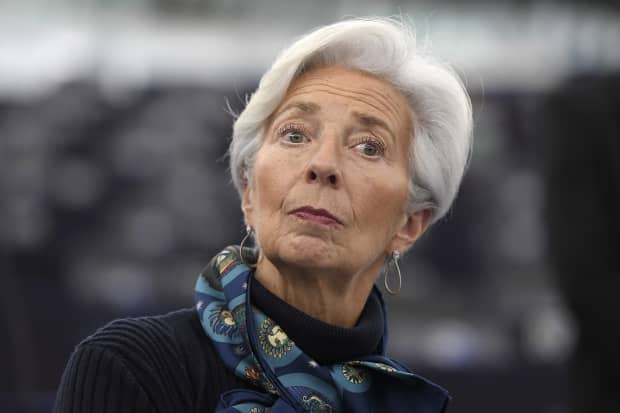This post was originally published on this site

President of the European Central Bank Christine Lagarde.
frederick florin/Agence France-Presse/Getty Images
It’s a race to the bottom for central banks. With the U.S. Federal Reserve adopting average inflation targeting, at least in principle, that puts pressure on foreign central banks to make dovish moves if they don’t want their currency to appreciate too much.
The statement from European Central Bank chief economist Philip Lane that the “euro/dollar rate does matter” has, for the moment, helped cap the rise in the shared currency. But expectations are for ECB President Christine Lagarde and her colleagues to build on that remark when the central bank announces its decision on Thursday at 7:45 a.m. Eastern (1:45 p.m. Central European Time), and then has its press conference at 8:30 a.m.
Besides the strength of the euro EURUSD, -0.19%, other topics in the spotlight include the staff’s new economic forecasts that are set for release, and the continuing strategy review.
Here’s what some leading ECB watchers expect:
| Firm | Comment |
| ABN Amro | We expect the ECB to emphasise that it stands ready to ease policy further to bring inflation back to its pre-crisis path. In addition, the Governing Council should stress again that although it does not target the euro, swings in the currency do impact its macro projections and hence the appropriate stance of its monetary policy. We think that the ECB will ease policy again by the end of this year, most likely in December. |
| Goldman Sachs | The Governing Council is likely to flag the recent euro appreciation, noting that the volatility in the currency requires monitoring. But we see a high bar for policy action given that ECB officials have historically not eased policy when euro strength predominantly reflected improving economic prospects (such as in 2017-18). Moreover, the Governing Council has few options to stem euro strength, given limited room for rate cuts and the possibility of further appreciation in response to more QE. We therefore expect ECB officials to continue to lean against euro appreciation by “talking down” the rate curve. |
| ING | As regards new macro projections, we expect the ECB to acknowledge the v-shaped rebound since the lifting of the lockdown measures, while at the same time still stress the high level of uncertainty. To some extent, comments by ECB officials over the last weeks suggested some slight differences regarding the ECB’s economic assessment. While Isabel Schnabel underlined that the ongoing recovery was basically in line with the ECB’s own base case scenario, Philip Lane sounded somewhat more cautious, pointing to the probability of a longlasting and only gradual recovery. We will have a close look at the ECB’s inflation projections. In June, the ECB expected an inflation rate of 1.3% for 2022. Any downward revision will increase the likelihood of additional monetary stimulus. |
| Morgan Stanley | After [last] week’s deflationary surprise, and with the drag from a stronger euro, we will be looking for any signal the ECB may act earlier, perhaps at the December forecast meeting, to defend the credibility of its inflation target. |
| RBC | The absolute level of ‘excess reserves’ is plentiful and even a sizeable reduction should not create upwards pressure on money market rates. In other words, the increased reserves created via the purchase and lending programmes should allow the ECB to conduct this step without jeopardising smooth transmission of their monetary policy. However, given that Executive Board member Schnabel said that the ‘ECB hasn’t yet discussed adjusting the tiering multiplier’, in an interview earlier this week, we see it more likely that this comes further down the line. At the very least, we would expect that this topic will be brought onto the agenda. If the ECB was more proactive, we could even see an increase in the multiplier allowing banks to deposit larger amounts with the ECB at 0% rather than -0.5% from the current six to, say, 8-9 times the minimum reserves. |
| Saxo Bank | The Federal Reserve’s decision to favor an average inflation target is not without consequences for other central banks but we don’t think it will drastically change the ECB’s stance on inflation. The debate regarding inflation targeting is still going on in academic and public circles – with [former ECB president] Jean-Claude Trichet indicating recently that the ECB should move to targeting core inflation for instance. But we believe it does not have much significance and that a symmetric 2% target, which gives more flexibility to the central bank, is already a done-deal. It is very unlikely at this stage that the ECB will move beyond that. |

